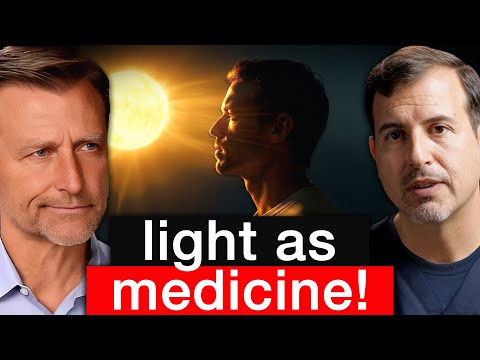You don’t need to spend a fortune on infrared devices to get plenty of infrared light. Check out this fascinating interview with Dr. Roger Seheult, an expert on sunlight and vitamin D, as we discuss the powerful health benefits of sunlight.
Discover how melatonin does more than help you sleep—watch these videos next:
▶️ https://youtu.be/sNklS0lzlgA
▶️ https://youtu.be/8MPpiCg5HUg
Watch this interview with Dr. Bruce Hollis for more information on vitamin D:
▶️ https://youtu.be/QAQ7r6jLEww
0:00 Welcome, Dr. Roger Seheult
4:05 The abscopal effect of light
4:58 What does light do in the body?
10:24 Infrared light and nature
12:06 The Green Heart study
13:45 Infrared light and sleep
21:24 Indoor lighting and your health
Please join me in welcoming Dr. Roger Shelly, quadruple board-certified in internal medicine, pulmonary diseases, critical care medicine, and sleep medicine.
Dr. Seheult shares some fascinating new research about the ability of sunlight to penetrate the human body. It’s been previously thought that the sun could only penetrate a few centimeters into our bodies, but recent research has shown that it can penetrate the entire body and can even be measured on the other side.
Surprisingly, randomized, placebo-controlled studies have shown that light can affect parts of the body that were not exposed to sunlight. This phenomenon is known as the abscopal effect. This means that mitochondria from one part of the body can communicate with each other and upregulate, even if they are not directly exposed to light.
Infrared light can stimulate the mitochondria to produce more melatonin, which can reduce oxidative stress. It’s not significantly affected by the atmosphere, so you can get it almost any time of the day. UVB light, which you need to make vitamin D, is more abundant when the sun is at its highest.
Green trees, leaves, and grass reflect infrared light. To maximize infrared light absorption, head to green spaces where nature can reflect infrared light back to you!
The Green Heart Study measured the HSCRP, which correlates with the risk of stroke or heart attack, in residents of South Louisville, Kentucky —a region characterized by concrete and a lack of greenery. Approximately 8,000 trees were planted in a 4-square-mile area, and the HSCRP was remeasured. This resulted in a 13% to 20% average drop in HSCRP, which correlates to a 10% to 15% reduction in stroke and heart attack risk, without any changes in diet or exercise.
Dr. Seheult also explains that daytime light exposure helps with sleep by supporting the circadian rhythm, while nighttime light exposure can have an opposite effect.
DATA:
https://www.researchgate.net/publication/393511800_Longer_wavelengths_in_sunlight_pass_through_the_human_body_and_have_a_systemic_impact_which_improves_vision
https://pubmed.ncbi.nlm.nih.gov/36671781/
Dr. Eric Berg DC Bio:
Dr. Berg, age 60, is a chiropractor who specializes in Healthy Ketosis & Intermittent Fasting. He is the Director of Dr. Berg Nutritionals and author of the best-selling book The Healthy Keto Plan. He no longer practices, but focuses on health education through social media.
Follow Me On Social Media:
YouTube: https://www.youtube.com/@Drberg/
YouTube Shorts: https://www.youtube.com/@UCpWhiwlOPxOmwQu5xyjtLDw
Keto Recipes: https://www.youtube.com/@drbergketorecipes
Facebook: https://www.facebook.com/drericberg
Instagram: https://www.instagram.com/drericberg/
Spotify Podcast: 🎧 https://drbrg.co/DrBerg-Spotify
TikTok: https://www.tiktok.com/@drbergofficial
X: https://x.com/dr_ericberg
Disclaimer:
Dr. Eric Berg received his Doctor of Chiropractic degree from Palmer College of Chiropractic in 1988. His use of “doctor” or “Dr.” in relation to himself solely refers to that degree. Dr. Berg is a licensed chiropractor in Virginia, California, and Louisiana, but he no longer practices chiropractic in any state and does not see patients, so he can focus on educating people as a full-time activity, yet he maintains an active license. This video is for general informational purposes only. It should not be used to self-diagnose, and it is not a substitute for a medical exam, cure, treatment, diagnosis, prescription, or recommendation. It does not create a doctor-patient relationship between Dr. Berg and you. You should not make any changes to your health regimen or diet before consulting a physician and obtaining a medical examination, diagnosis, and recommendation. Always seek the advice of a physician or other qualified health provider with any questions you may have regarding a medical condition.
#health #keto #ketodiet #weightloss #ketolifestyle #intermittentfasting #lowcarb
Thanks for watching! I hope you enjoyed this interview with Dr. Seheult. I’ll see you in the next video.



